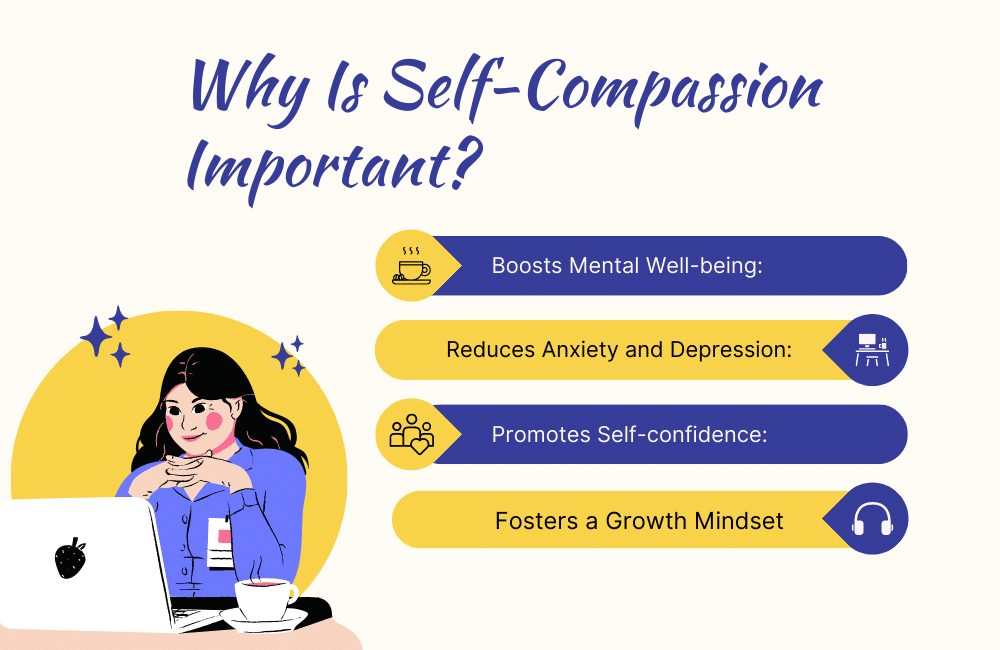In our journey of self-improvement and personal growth, we often forget a critical ingredient – self-compassion. It’s the gentle act of extending kindness towards ourselves, especially during times of failure, stress, or hardship. But how do we foster this invaluable trait?

Let’s delve into practical steps on how to practice self-compassion and unlock a new dimension of inner peace and self-acceptance.
Understanding Self-Compassion
Before we immerse ourselves in the ‘how’, it’s essential to understand the ‘what’ of self-compassion. Simply put, self-compassion is treating yourself with the same kindness, understanding, and patience you would offer to a friend in distress. It involves acknowledging your mistakes and shortcomings without harsh judgment or self-criticism. Self-compassion is the catalyst that fuels emotional resilience and fosters a positive self-image.
Why Is Self-Compassion Important?
Self-compassion is not merely a concept; it’s a practice, a lifestyle choice that can significantly improve the quality of your life. Here’s a detailed look at why self-compassion is vital:

- Boosts Mental Well-being: Self-compassion involves treating oneself with kindness, understanding, and forgiveness, much like how you would treat a close friend. This fosters a sense of warmth towards oneself, enhancing overall mental well-being.
- Reduces Anxiety and Depression: Studies have shown that self-compassion can help decrease symptoms of anxiety and depression. By adopting a self-compassionate perspective, individuals learn to treat themselves kindly during stressful periods, mitigating the impact of these mental health conditions.
- Promotes Self-confidence: Self-compassion provides a healthier way of relating to oneself, promoting authentic self-confidence. Instead of confidence built on external validation, self-compassion encourages us to embrace our strengths and weaknesses equally, leading to robust and resilient self-esteem.
- Fosters a Growth Mindset: Self-compassion recognizes that failure is a part of the human experience. This understanding allows us to see setbacks as opportunities for growth and learning, fostering a growth mindset instead of a fixed mindset where mistakes are seen as personal deficiencies.
- Encourages Healthy Habits: Self-compassionate individuals tend to adopt healthier lifestyle habits. They are more likely to engage in self-care activities and less likely to neglect their health or engage in risky behaviors.
- Enhances Relationships: Self-compassion can also improve our relationships with others. By learning to be compassionate towards ourselves, we cultivate the capacity to extend that same compassion to others. This can lead to more satisfying and meaningful relationships.
- Promotes Resilience: Self-compassion provides a safety net, allowing us to rebound quickly from adversities. It gives us the strength to acknowledge our struggles, face our fears, and move forward.
Incorporating self-compassion into your daily routine can open the doors to a healthier, more fulfilling life. By giving yourself the same kindness and respect that you give to others, you create a safe space for growth, resilience, and genuine happiness.
How to Practice Self-Compassion
- Mindfulness: Cultivating self-compassion begins with mindfulness, the ability to be present in the moment and accept your experiences without judgment. Through mindfulness, you become aware of your self-critical voice and learn to replace it with a more compassionate one.
- Self-Kindness: Replace self-criticism with self-kindness. Encourage yourself the way you would a friend. Use kind, gentle words in your self-talk, acknowledging that everyone makes mistakes and struggles sometimes.
- Common Humanity: Recognize that suffering, failures, and inadequacies are part of the shared human experience. Understanding that you’re not alone in your struggles fosters self-compassion and decreases feelings of isolation.
Self-Compassion Exercises
Practicing self-compassion can be enriched by incorporating specific exercises into your daily routine. Here are a few to get you started:
- Self-Compassion Break: Whenever you find yourself stressed or overwhelmed, pause and remind yourself of the three components of self-compassion: mindfulness, self-kindness, and common humanity.
- Writing a Self-Compassionate Letter: Write a letter to yourself as if writing to a friend in a similar situation. This practice can help you shift perspective and engage with yourself more compassionately.
- Meditation: Guided self-compassion meditations can help cultivate a more compassionate mindset. This can be particularly helpful when dealing with feelings of inadequacy or failure.
Tips for Cultivating Self-Compassion
- Patience is Key: Self-compassion is a journey, not a destination. Be patient with yourself as you learn to replace self-criticism with self-kindness.
- Seek Professional Help: If you’re finding it hard to cultivate self-compassion, consider seeking help from a mental health professional. They can guide you through the process and provide additional support.
Final Thoughts
Cultivating self-compassion can profoundly influence your mental and emotional well-being. While the path may be challenging, the benefits are worth the effort. As you start treating yourself with more kindness and less judgment, you’ll find a greater sense of peace and acceptance – a testament to the transformative power of self-compassion.

